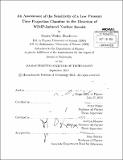An assessment of the sensitivity of a low pressure time projection chamber to the direction of WIMP-induced nuclear recoils/
Author(s)
Henderson, Shawn Wesley
DownloadFull printable version (31.20Mb)
Other Contributors
Massachusetts Institute of Technology. Department of Physics.
Advisor
Peter Fisher and Jocelyn Monroe.
Terms of use
Metadata
Show full item recordAbstract
Direct directional detection of dark matter could provide an unambiguous observation of dark matter due to the predicted directional anisotropy of dark matter particles in the galactic reference frame. The Dark Matter Time Projection Chamber (DMTPC) collaboration develops TPCs with optical readout whose goal is the detection of the sense and direction of nuclear recoils generated by dark matter interactions with carbon and fluorine atoms in low pressure CF 4 gas, from which the direction of the incident dark matter particle can be inferred. The TPC contains a mesh based amplification stage that facilitates the two-dimensional imaging of nuclear recoil tracks using CCD cameras. Reconstructing the direction of recoils has been a subject of intensive R&D over the past several years, culminating in the design and construction of a current generation detector, the "4-shooter." The 4-shooter is prototyping several new detector techniques for a larger (1 m3 ) detector. The third dimension of recoils will be reconstructed in this detector using PMTs and the timing of induced charge signals in the detector amplification region. The 4-shooter's performance has being studied extensively on the surface of the Earth at MIT using alpha particles, low energy neutrons, and X-rays. This thesis reports on surface commissioning data taken with the 4-shooter.
Description
Thesis (Ph. D.)--Massachusetts Institute of Technology, Dept. of Physics, 2013. Cataloged from PDF version of thesis. Includes bibliographical references (pages 207-219).
Date issued
2013Department
Massachusetts Institute of Technology. Department of PhysicsPublisher
Massachusetts Institute of Technology
Keywords
Physics.